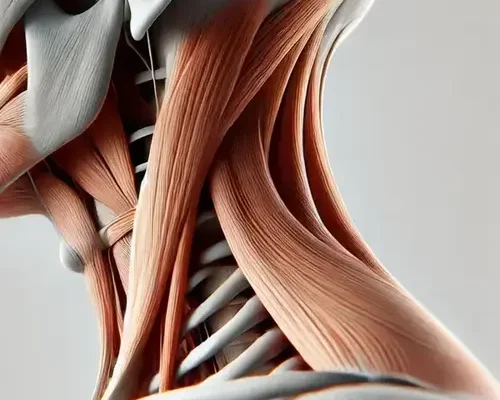Have you ever found yourself struggling to hold your head up during long meetings or while sitting at your desk? This seemingly simple act can become difficult and painful for some people. It’s not just a sign of tiredness; there could be underlying causes at play.
A Common Complaint, Often Overlooked
While neck pain is a well-known problem, the inability to hold the head upright for prolonged periods is often underreported. This condition, sometimes linked to muscle weakness, can drastically affect daily life.
Let’s look into some real stories and explore why this happens.
Case 1: Luca’s Journey from Tech Strain to Muscle Recovery
Luca, a 34-year-old software engineer, began experiencing neck pain that felt like a constant weight pulling his head down. After hours in front of his computer, he noticed his head felt “too heavy” to hold up.
Diagnosis: Postural muscle fatigue from prolonged desk work, leading to a weakened trapezius and cervical muscles.
Solution: Physiotherapy and ergonomic adjustments at work, including frequent posture breaks and stretching exercises.
Luca’s outcome: “It took a while, but consistent strengthening exercises changed my life. Now, I can work without feeling like my head weighs a ton.”
What Causes Neck Muscle Weakness?
Neck muscle weakness can arise from several factors, and understanding the underlying cause is key to finding a solution. Below are common culprits:
| Cause | Description |
|---|---|
| Postural Strain | Poor posture while sitting for long hours puts extra strain on neck muscles. |
| Cervical Disc Issues | Herniated discs can affect nerve function, making it harder to support the head. |
| Degenerative Disc Disease | Aging or injury may lead to spinal wear and tear, weakening neck stability. |
| Muscle Deconditioning | Lack of physical activity causes the muscles to weaken over time. |
| Myasthenia Gravis | This autoimmune disease causes muscle weakness, including neck muscles. |
| Whiplash | Sudden neck trauma can leave long-term muscle instability and weakness. |
Case 2: Anya’s Struggle with Chronic Neck Pain
Anya, a 52-year-old teacher, had dealt with chronic neck pain for years. Recently, holding her head up during her lectures had become unbearable, leading to increased fatigue and frustration.
Diagnosis: Degenerative disc disease with associated muscle weakening.
Solution: A combination of physical therapy, core muscle strengthening, and anti-inflammatory medication.
Anya’s perspective: “I had no idea how much degeneration had happened in my neck. It was eye-opening, but I’m learning to adapt and manage the pain.”
The Role of Posture and Technology in Neck Strain
It’s no secret that modern technology contributes to posture problems. Here’s how your daily habits might be leading to the difficulty in holding your head up:
- Text Neck: Constantly looking down at your phone puts an unnatural strain on the neck muscles.
- Slouched Sitting: Sitting hunched over a laptop for long hours weakens the muscles that stabilize your neck.
If you can relate, don’t worry; small changes can make a big difference.
Case 3: Miguel’s Quick Fix for Desk-Related Neck Pain
Miguel, a 28-year-old graphic designer, noticed neck fatigue after working long hours. He didn’t have a serious medical issue, but his lifestyle was affecting his muscles.
Diagnosis: Postural strain from prolonged screen time.
Solution: Simple adjustments like a standing desk and using a phone holder reduced the strain dramatically.
Miguel’s insight: “It wasn’t a big fix, but it changed everything. Just being more mindful of my posture has really helped.”
Solutions: How to Keep Your Head Held High
If you’re struggling with neck muscle weakness, you’re not alone, and there are several steps you can take to improve the situation.
| Solution | Actionable Tips |
|---|---|
| Physical Therapy | Focused on strengthening neck and upper back muscles. |
| Ergonomic Adjustments | Use proper chair height, screen position, and support for long work hours. |
| Stretching and Strengthening | Simple exercises like chin tucks, neck stretches, and shoulder rolls help a lot. |
| Mindful Posture | Check your posture regularly, and avoid slouching during screen use. |
| Core Strengthening | Strengthening your core muscles helps stabilize the neck and shoulders. |
| Breaks and Movement | Take frequent breaks from sitting to avoid muscle fatigue. |
Final Thoughts: Understanding Your Body’s Signals
Your body is trying to tell you something when holding your head upright becomes difficult. Whether it’s poor posture, weakened muscles, or an underlying condition, there are ways to find relief.
By listening to real stories like Luca’s, Anya’s, and Miguel’s, you can recognize the importance of early diagnosis and proper care. If you’re facing similar symptoms, it’s time to make small adjustments that will make a big difference in your daily life.









